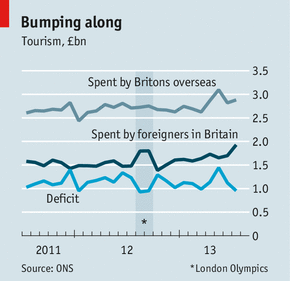Tourism and the economy
旅游與經(jīng)濟
Easy come, easy go
來也匆匆去也匆匆
Booming post-Olympics tourism won’t boost the economy as much as hoped
蓬勃發(fā)展的后奧運旅游不會如期望那樣提振經(jīng)濟
Sep 28th 2013 |From the print edition
BRITONS have had some good economic news to celebrate over the past few months. Unemployment is falling, house prices in England hit a record high in July and economic output appears to be growing at its fastest pace since 2010.
過去幾個月英國人有很多利好的經(jīng)濟新聞值得慶祝。失業(yè)率在下降,7月英格蘭的房價創(chuàng)下歷史新高,GDP呈現(xiàn)自2010年來的最快增速。
At first glance Britain’s tourism industry appears to be contributing to the economic bounce. Data released this month by the Office for National Statistics suggest that there has been a big increase in foreign tourists visiting Britain since London hosted the Olympics last year. In the first seven months of 2013, foreign visitor numbers rose by 4%, compared with the same period in 2012, and spending was up 12%. In July 2013 foreign visitors spent 30% more than in July 2012, setting a new record.
乍一看,英國的旅游業(yè)對經(jīng)濟反彈有所貢獻。英國國家統(tǒng)計局本月公布的數(shù)據(jù)表明,自去年倫敦舉辦奧運會以來前往英國旅游的外國游客數(shù)量大增。2013年的前7個月相比2012年同期外國游客數(shù)量增加了4%,游客花費也增加了12%。2013年7月外國游客花費比去年同期增加了30%,創(chuàng)下了新紀錄。
Hotels and attractions nationwide say they are benefiting from the unexpected boost in the tourist trade. According to data produced by STRGlobal, a consultancy, hotel-occupancy rates rose in nearly every English region in the first half of 2013. London, in particular, has seen a surge in foreign tourists since the Olympics ended: hotel-occupancy rates in the capital jumped by seven percentage points to 89% in June compared with a year earlier.
全國范圍內(nèi)的旅館和旅游景點表示他們從旅游貿(mào)易意想不到的增加中受益。據(jù)咨詢公司STRGlobal的數(shù)據(jù)顯示,2013年前半年英國所有區(qū)域的酒店入住率都有所上升。尤其是倫敦的外國游客數(shù)量激增,奧運會結束以來,六月份倫敦的酒店入住率從去年的7%增加到89%。
The government has been quick to attribute the tourism boom to the Olympics, in an effort to justify some of the £8.9 billion ($14.3 billion) spent staging them. There may be some truth in this. Visits from countries keen on the Olympics increased the most: up by 24% from Latin America and 11% from China, compared with growth of 1% from Europe and a fall of 4% in visitors from North America, according to VisitBritain, a tourism quango.
政府迅速將這歸因于奧運會的旅游熱潮,努力為奧運會高達89億英鎊(143億美元)的花費辯護。可能有一些道理。根據(jù)旅游半官方機構旅游英國的數(shù)據(jù),來自熱衷于奧運會國家的游客數(shù)量增長最多,相比歐洲增長的1%和北美4%的下降,來自拉丁美洲的游客數(shù)量增長了24%,來自中國的游客數(shù)量增長了11%。
Will this post-Olympics surge in visitors attracted to Britain contribute much to its economic recovery? The net impact of tourism on output depends not only on how much cash foreign visitors spend, but also on what Britons spend abroad. And although record amounts are being spent in Britain by foreign tourists, Britons have upped their spending on foreign holidays by a similar amount. So far for 2013, the gap between what Britain earns and spends on tourism has remained around the same since the summer of 2011 (see chart). The average monthly tourism deficit for January to July 2013 was £1.125 billion, only £7m less than the previous two years’ average. And in spite of the influx of tourist cash this year, the tourism deficit this summer is still higher than during the Olympics.
后奧運會英國游客激增會對英國經(jīng)濟復蘇帶來很大的貢獻嗎?旅游增長的凈影響不僅取決于外國游客的消費,同時取決于英國游客出國的花費。盡管外國游客在英國的花費創(chuàng)了紀錄,英國人在國外度假的消費也創(chuàng)下了相似的紀錄。到2013年的目前為止,英國人在旅游上的花費和收入的差距一直跟2011年夏天沒什么變化(見表)。2013年1月至7月的平均月旅游赤字為11.25億英鎊,只比上兩年的平均水平少700萬英鎊。盡管今年大量現(xiàn)金從旅游業(yè)涌入,今年夏天的旅游赤字仍高于奧運會期間。

Trading what Britain has lots of—rain and heritage—for reliable sunshine, which it lacks, may be no bad thing for most Britons. But tourism will have less to offer the economic recovery unless more Britons can be persuaded to holiday at home rather than overseas. Alas, selling rainy Britain abroad may prove easier than selling it to Britons themselves.
將英國的陰雨和遺產(chǎn)同其缺乏的陽光作交換對大多數(shù)英國人來說沒什么壞處。但是除非更多的英國人選擇在本土度假,不然旅游業(yè)對英國經(jīng)濟復蘇的影響將會很小。可惜的是,將陰雨連綿的英國推銷給外國人比賣給自己人容易多了。











